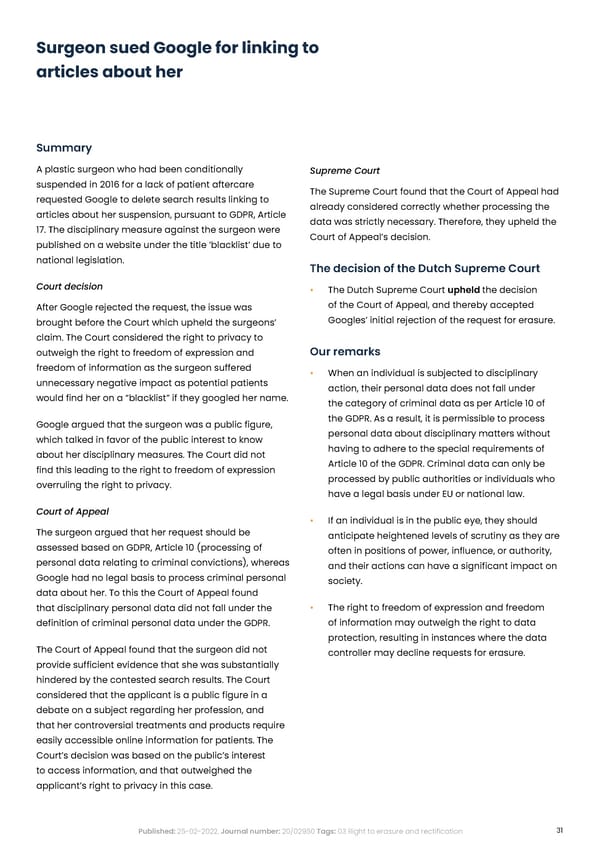Surgeon sued Google for linking to articles about her Summary A plastic surgeon who had been conditionally Supreme Court suspended in 2016 for a lack of patient aftercare The Supreme Court found that the Court of Appeal had requested Google to delete search results linking to already considered correctly whether processing the articles about her suspension, pursuant to GDPR, Article data was strictly necessary. Therefore, they upheld the 17. The disciplinary measure against the surgeon were Court of Appeal’s decision. published on a website under the title ‘blacklist’ due to national legislation. The decision of the Dutch Supreme Court Court decision • The Dutch Supreme Court upheld the decision After Google rejected the request, the issue was of the Court of Appeal, and thereby accepted brought before the Court which upheld the surgeons’ Googles’ initial rejection of the request for erasure. claim. The Court considered the right to privacy to outweigh the right to freedom of expression and Our remarks freedom of information as the surgeon suffered • When an individual is subjected to disciplinary unnecessary negative impact as potential patients action, their personal data does not fall under would find her on a “blacklist” if they googled her name. the category of criminal data as per Article 10 of Google argued that the surgeon was a public figure, the GDPR. As a result, it is permissible to process which talked in favor of the public interest to know personal data about disciplinary matters without about her disciplinary measures. The Court did not having to adhere to the special requirements of find this leading to the right to freedom of expression Article 10 of the GDPR. Criminal data can only be overruling the right to privacy. processed by public authorities or individuals who have a legal basis under EU or national law. Court of Appeal • If an individual is in the public eye, they should The surgeon argued that her request should be anticipate heightened levels of scrutiny as they are assessed based on GDPR, Article 10 (processing of often in positions of power, influence, or authority, personal data relating to criminal convictions), whereas and their actions can have a significant impact on Google had no legal basis to process criminal personal society. data about her. To this the Court of Appeal found that disciplinary personal data did not fall under the • The right to freedom of expression and freedom definition of criminal personal data under the GDPR. of information may outweigh the right to data protection, resulting in instances where the data The Court of Appeal found that the surgeon did not controller may decline requests for erasure. provide sufficient evidence that she was substantially hindered by the contested search results. The Court considered that the applicant is a public figure in a debate on a subject regarding her profession, and that her controversial treatments and products require easily accessible online information for patients. The Court’s decision was based on the public’s interest to access information, and that outweighed the applicant’s right to privacy in this case. Published: 03-12-2021 , Journal number: 21/00241 Tags: 01 Legal basis and principles of processing Published: 25-02-2022, Journal number: 20/02950 Tags: 03 Right to erasure and rectification 31
 Complycloud EU GDPR Report Page 30 Page 32
Complycloud EU GDPR Report Page 30 Page 32